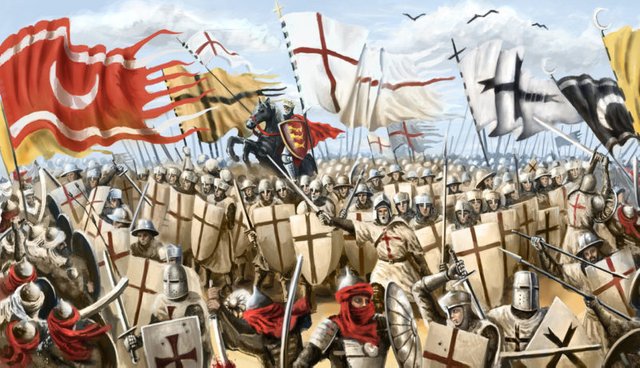The Crusaders had been successful at the beginning mainly because the Turks did not advance together against the enemy. After setting up their own empires, the army leaders squandered their strength in the struggle for succession to the throne, not realizing how critical their isolated position was away from Europe. It was therefore easy for the Seljuk Turks to win back Edessa in 1144, because neither the other Crusader states nor Constantinople provided any significant help. Awakened by this defeat, in 1145 Pope Eugene III, propagandistically supported by Abbot Bernard of Clairvaux, called for the reconquest of the lost territories. King Louis VII of France and the Conversions King Konrad III. followed the call and set out with their armies on the way to Jerusalem. In Constantinople, Manuel I Komnenos, a grandson of Emperor Alexios, sat on the throne. Despite the unfortunate experiences of his grandfather, he was inclined to the West and supported the Crusaders with supplies and supplies. However, in order not to destroy the fragile balance in the region, the emperor also concluded a truce with the Seljuk Turks. When it came to the security of the Reich, he preferred realpolitik over ideology. When the armies arrived in Constantinople in September 1147, the same ceremony that had taken place at the beginning of the First Crusade was repeated: the crusaders had to make a non-aggression promise and only then were allowed to go their own way.
But despite all efforts, it quickly led to tensions among the allies, because just kept the troops of Konrad in Constantinople repeatedly riots. Other problems arose when the Staufer with his troops against the recommendation Manuels across Anatolia wanted to pull instead of choosing the safer coastal route. At the end of October, that was exactly what the Byzantine had feared. In a coup, the Turks destroyed Konrad's troops, which had been completely exhausted by the exertions. He took the coastal route, but fell ill and had to return to Constantinople. In the meantime the troops of Louis had arrived in Constantinople. However, when they heard of the truce between Manuel and the Seljuk Turks, they sensed treachery and were about to declare war on the Byzantines. Only the prudence of Ludwig was due to the fact that it did not come to a military conflict. Yes, the king was even willing to swear allegiance to Manuel. The German crusaders had joined the French army, and their march to Antioch was a single catastrophe. Half way through, the supplies ran out, and it was hard for the men to reach their destination next spring. In Ludwig's eyes, of course, this disaster was attributable to Manuel alone, but nevertheless he hurried on to Jerusalem. There Konrad Konrad had meanwhile arrived by ship. It was possible to set up an army of over 50,000 men - the largest concentration of troops the Crusaders had ever brought together.
